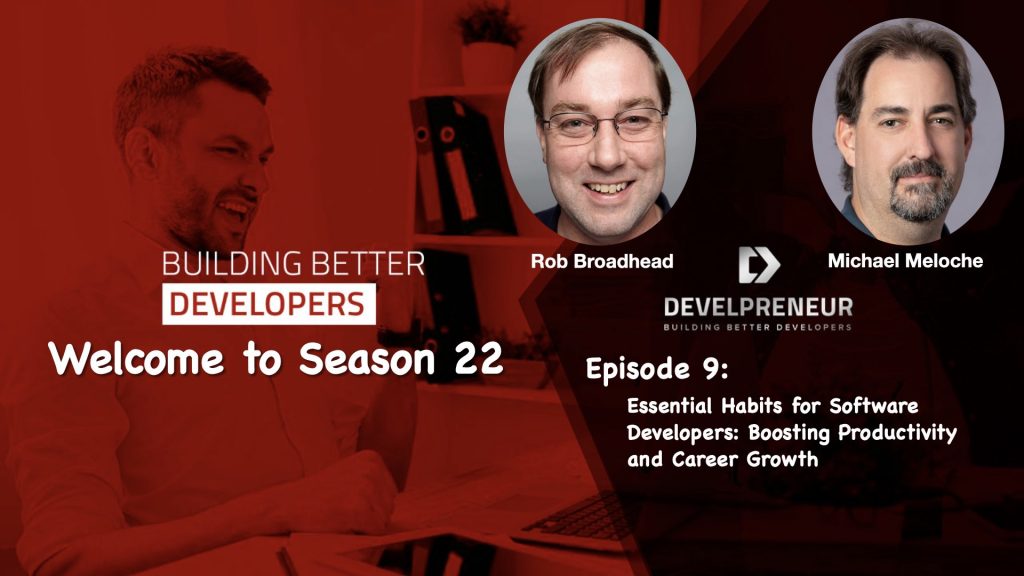In the latest episode of our podcast focused on the developer journey, we explore the critical topic of good and bad habits that can significantly impact a software developer’s career and overall productivity. As we’re midway through the year, it’s an opportune time to reflect on our practices and consider areas for improvement.
The Power of Status Reporting Habits
One of the most effective developer productivity habits is regular status reporting. This might seem tedious initially, but it offers substantial benefits over time. A daily stand-up routine, similar to Agile methodologies, can help you reflect on your progress and plan your day effectively.
For instance, every morning, take a few minutes to answer these three questions:
- What did I accomplish yesterday?
- What am I working on today?
- Are there any blockers?
Doing this creates a mini-retrospective that keeps you on track and provides a clear picture of your progress. This habit can be implemented using various tools, from old-school pencil and paper to modern apps like Evernote or Trello.
Managing Your Task List
Another critical developer productivity habit is managing your task list efficiently. It’s essential to keep your list concise to avoid feeling overwhelmed. Try writing down no more than four critical tasks for the day. This can be done on an index card or a small piece of paper to limit the number of items you can list.
For example, if your daily tasks include:
- Fixing a bug in the user authentication module
- Writing a new feature for the dashboard
- Reviewing code for a colleague
- Updating project documentation
This focused approach ensures you tackle essential tasks without being distracted by less critical ones. Using this method, you can maintain a steady pace and avoid being busy without being productive.
The Pomodoro Method
Effective time management is crucial for maintaining productivity. One of the most recommended techniques is the Pomodoro Method. This involves working in short, focused bursts (typically 25 minutes), followed by a short break.
For instance, set a timer for 25 minutes and work on a specific task without interruptions. Once the timer goes off, take a five-minute break to recharge. Repeat this process four times, and then take a longer break of 15-30 minutes. This method helps prevent burnout and keeps you focused on your tasks.
Taking Meaningful Breaks
Taking breaks might seem counterproductive, but it’s one of the best developer productivity habits you can adopt. Regular breaks can prevent mental fatigue and increase your efficiency.
For example, step away from your desk during your lunch break and do something different. You could read a book, walk, or engage in a hobby. This change of pace can refresh your mind and improve your focus when you return to work.
Continuous Learning Habits
To stay relevant and improve your skills, make it a habit to learn something new every day. Spend 15-30 minutes daily learning new coding techniques, exploring new tools, or understanding new frameworks.
For example, if you’re a Java developer, you might spend some time learning about the latest updates in Java. Or, if you’re interested in automation, you could explore tools like Selenium or Jenkins. This habit keeps your skills sharp and adds variety to your day, making your work more interesting.
Establishing Good Work Routine Habits
Finally, establishing a consistent work routine is crucial. Determine the hours when you are most productive and stick to that schedule. This helps create a rhythm and reduces the difficulty of deciding when to work each day.
For example, if you are most productive in the morning, start your workday at 8 AM and take a lunch break around noon. Resume work in the afternoon and aim to finish by 5 PM. Consistency in your work hours helps maintain a work-life balance, preventing burnout and increasing productivity.
The Power of Consistent Habits
In conclusion, integrating these developer productivity habits into your daily routine can enhance your efficiency, stay organized, and maintain a healthy work-life balance. These habits improve your productivity and contribute to your overall job satisfaction. Start implementing these strategies today and see their difference in your developer journey.
Feel free to share your thoughts and tell us about the habits that have impacted your career. What are some of the good or bad habits you’ve experienced? Your insights could help others in their journey to becoming better developers.
Stay Connected: Join the Developreneur Community
We invite you to join our community and share your coding journey with us. Whether you’re a seasoned developer or just starting, there’s always room to learn and grow together. Contact us at [email protected] with your questions, feedback, or suggestions for future episodes. Together, let’s continue exploring the exciting world of software development.


[…] Essential Habits for Software Developers: Boosting Productivity and Career Growth […]